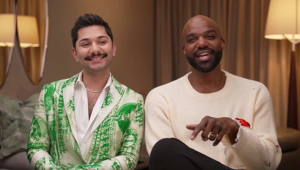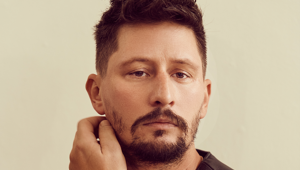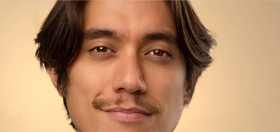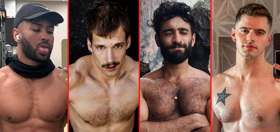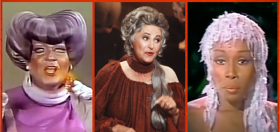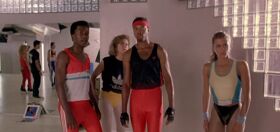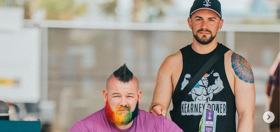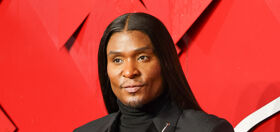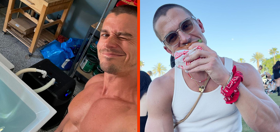
Ron Nyswaner was ahead of his time.
A quarter-century years ago, his screenplay for the film Philadelphia scored him an Academy Award nomination and changed the face of Hollywood. Former sitcom star Tom Hanks became Tinseltown’s foremost dramatic actor, nabbing his own first Oscar, as did soundtrack composer Bruce Springsteen.
Director Jonathan Demme, who had just won an Oscar for The Silence of the Lambs, confirmed his position as one of the premiere directors in the world.
Most crucially, Philadelphia marked the moment mainstream Hollywood woke up to the AIDS crisis. The film chronicles the final days of successful lawyer Andy Beckett (Hanks) who loses his job when his boss (Jason Robards) learns he has HIV. As AIDS begins to end Andy’s life, he enlists the help of an ambulance-chasing lawyer named Joe Miller (Denzel Washington) to file a wrongful termination suit.
How about we take this to the next level?
Our newsletter is like a refreshing cocktail (or mocktail) of LGBTQ+ entertainment and pop culture, served up with a side of eye-candy.
It’s hard to overstate the effect of the film, which helped mainstream America feel compassion for people with AIDS and the monumental loss the gay community continued to suffer.
Since the breakthrough film, Ron Nyswaner has gone on to pen the film Soldier’s Girl (itself a seminal film about a transgender woman) and to executive produce the hit Showtime series Homeland and Ray Donovan.
Now Sony Pictures marks the 25th Anniversary of Philadelphia with a special 4k Ultra HD Special Edition Blu-Ray release of the film November 27.
Queerty caught up with Nyswaner to chat about the film’s legacy, his career, and how far the community has come.
So congratulations on the movie hitting the 25-year mark. That’s exciting.
It is, in a way. I’m happy to still be around and still doing interviews 25 years later. The other thing is, you’re aware that time marches on.
We’ve had so many breakthroughs in treatment for HIV. At the same time, a number of people in the film, as well as Jonathan Demme, who directed, are no longer with us (the film utilized more than 50 real-life AIDS patients in the cast). With all of this in retrospect, how does it feel revisiting the film after all this time?
You know, it’s a very personal experience for me. It was certainly the greatest experience of my working life. Without a doubt. And I’m talking about the whole four, year five year—actually more like a six-year-long process. Talking with Jonathan, then spending two years finding the right story to tell, then working on the script, shooting it, the release. And after the release, I did a lot of traveling around the country where I spoke to a lot of people in some very unusual situations. I went to Notre Dame to speak to gay students there, but at that time [the University] would not acknowledge that they had gay students there. There was no gay center or meeting place, so we actually had to meet in the psychological counseling office…

Oh my lord. That’s awesome.
[Laughter]
But it was amazing because I was in a room with like 30 people. Some were professors, some were students from Notre Dame, and they were like, Yeah, all the guys on my floor know I’m gay. Nobody cares. Like, the school cares officially, but nobody else cares. So there was this sort of joyful thing of people being comfortable with themselves at a time when it was harder to be comfortable with yourself. So a lot has changed, and I’m amazed by some of the changes. We weren’t actually advocating for gay marriage when I started, when I came out of the closet. And remember, I came from the 70s where we all were talking about how nobody would be married eventually and we’d all be living in communes and raising each other’s children.
[Laughter]
So it was actually very bourgeois to be pro-marriage when I was becoming politicized. So I had to adjust to that, that, of course, that’s a civil right we should advocate for and fight for. So the world has definitely changed in many ways.
At the time you wrote the film, being an out-gay anything in Hollywood was still enormously risky. Had you come out professionally prior to penning the script? I know you were at least semi-out…
Semi-out? That’s not true at all. I was out of the closet when I arrived in Hollywood in 1982. I had lived completely out of the closet professionally. As a matter of fact, I wrote my first gay-themed script—which wasn’t ever made—in 1985. I wrote this, at Fox, when Scott Rudin was the head of production there, he commissioned me to write a script, a sort of John Hughes-like script with gay teenagers at the center of it. And unfortunately, it never got made.
So that closet door flew open a few decades ago, and it has never even ever been shut in any way.
That’s fantastic.
So I think, in some ways, that’s the gay activism for me. I’ve just been who I am, and whatever the consequences are, were the consequences. I don’t think, for me, I don’t think they are very negative in terms of my career.
Awesome. So when you decided to write this film about a lawyer dying of AIDS, were you advised against it by anyone? Your agents? Were you anxious about doing it?
Not at all. It was such a different time. You were very young at the time, but there was this thing happening in our culture, where AIDS was what everyone was talking about. Now, I can’t remember outside of this context, a conversation that I’ve had about AIDS in the past several years. We don’t talk about it anymore unless you’re talking to someone who works in healthcare or is an LGBTQ activist or advocate. But it was something everyone was talking about. Kids were being asked to leave school. People were constantly saying, “Can I share a bathroom with someone? Should this person be teaching in our school? What if he touches a student?”

So it was on everybody’s mind, and therefore it seemed like a very natural thing. And by the way, we weren’t the only script or the only movie ever made about it. There were really great movies like Parting Glances, Longtime Companion. So I was never advised never to do this. People just encouraged me. And everyone who came to the movie came with that open-hearted attitude. Jason Robards [who plays Andy’s boss in the film], a legend of the American theatre shows up. And I walk over and shake his hand and say, “Mr. Robards, thank you for being in our movie.” And he said to me, “Ron, I’d have been here if I just had one line to say.”
And the man had two Oscars.
That’s how everyone felt. They felt there was a moral compunction to make this movie. The head of Orion, and then it became Tri-Star [the studios producing the film] Mark Platt, when Jonathan and I pitched our take to him—that this was a civil rights drama—this is what Mark Platt said: “Ron, Jonathan, there are 10 movies, a total of 10 scripts in development around Hollywood right now [1990]. All of them have a heterosexual main character.”
Wow.
The next thing he said was, “that is immoral.” We were going to make the move that needs to be made about AIDS with a homosexual main character. So there was no resistance in Hollywood, or at least we went to the right person. And Mark Platt and Mike Medavoy, who was the top executive then at Tri-Star, just encouraged us to make the movie.
Related: ‘The Last Mile’ looks back at ‘Philadelphia,’ the horror of AIDS and how far we’ve come
So I know you had a working relationship with Jonathan Demme already at that point. How involved were you in casting?
I was so tied to Jonathan for about four years while we were making this movie. I was involved with everything and certainly aware of what was happening and who was involved. One of my favorite memories of the movie is when Antonio [Banderas, who was little known in the US at the time] came from Spain to read for the part of Miguel [Andy’s boyfriend]. There were about five of us in the room when he read. And he’d learned the script phonetically. His English was not good.
And…[slight pause] can I say this? You’re Queerty, I think I can say this…
By all means, please do.
So when Antonio read the scene with Tom. First of all, Antonio said to Tom, “So Tom, you play homosexual before in movies?”
[Laughter]
So Tom, being Tom Hanks, says, “You know, Antonio, I’ve been passing up all those homosexual roles they keep offering me.”
Because Antonio, you know, he’d played a gay person in Spain for Almodovar. You know, he didn’t understand that this was an unusual experience.
So Jonathan asks Antonio to leave the room so we could discuss, and of course, he was so great in the reading. And Jonathan’s first words to everybody were, “Nyswaner has a woody. So that’s a yes.”
[Laughter]

That’s hilarious.
So yes, I was involved with the casting. And there was this whole thing about how I was in love with Antonio, you know. It was a constant joke on the set with my following Antonio around.
At that time, I don’t know who wouldn’t be in love with Antonio.
Or today.
Or today. I’ve heard a persistent rumor that one of the main cast—I won’t say who—was quite vocal about being uncomfortable around gay people and had advised other actors never to take gay roles. Was that something you encountered? Was there any homophobia on the set?
No. On the set of Philadelphia? No, of course not. At the production meeting, the first big production meeting, this is what was said by Jonathan Demme and Kenny Utt, who was an Executive Producer: “On this movie, everyone down to the person who makes the coffee, who guards the parking spots, every PA will be treated with the utmost respect. That is non-negotiable.” And that was where we started, and that was how it went. It was actually a very joyful set.
Larry Kramer, in particular, called Philadelphia too “straight” and accused it of soft-pedaling the disease. This is something you’ve been vocal about in recent years, not with this film, but with Freeheld, a movie you wrote where you accused the producers of softening the gay elements. I also know that there were bits cut from Philadelphia that showed Andy & Miguel in bed together.
I think that no film is going to be everything to everybody. It can’t do everything. It’s so funny, people keep talking about the controversy. I had two years of love after [the film]. I went on speaking tours around the country and talked to lots of people. And there was lots of love. I didn’t have people yelling at me or anything like that. So I think there was controversy being written about, but I didn’t experience that at all.
I responded then, as I respond now, Yeah, it’s not perfect. It’s a movie. We couldn’t foresee that it was going to be this huge, international hit that would be embraced by audiences all over the world. We couldn’t foresee that. So were we a little cautious? Yes, but literally… I’m going to tell you this David, and it’s absolutely the truth: I never remember a conversation with anybody saying, “That’s going to be too gay, we have to take that out.” Now, when the scene you were referring to was cut, I was disappointed, but that was about momentum.
Pacing issues…
The film was 10 minutes too long, and we had to cut something. I was disappointed, but that was the scene that was cut. I don’t believe they were secretly homophobic and that’s just what they were saying. I do believe that’s what they were doing. In retrospect, we would have gladly ignored or avoided all that controversy and kept that scene in. If we knew people were going to yell about it for 25 years we would have done it. You can’t really foresee how people are going to respond to a film. So I’m incredibly proud of the film. I know it affected a lot of people in a positive way because they’ve spent 25 years telling me, as recently as two days ago. I was at a corporate event in London because I work for Freemantle Media now. And a French writer/producer approached me and said: “Because of your movie I’m a writer.”
Wow.
He said, “I realized when I saw your movie that I could write about who I was. So thank you.” So that’s what I know about the movie. I’ve been told for 25 years by people that it had a positive effect on their lives.

Add one more to the chorus. That was the first time I’d ever seen gay people portrayed on screen. I remember thinking they seem so nice. Little did I know how much time I would be spending with gay people in the future…as one of them.
[Laughter]
Wait, were you too young to have that little feeling of recognition? You thought it was still them not you?
Well, I recognized where my eyes were going, you know, at the pool or whatever, but I didn’t know what that meant. I’m from a town of 2,000 people in the Midwest, a farm town.
So you get a much-deserved Oscar nomination. And then you don’t work for a decade. I know that was because you were dealing with personal demons at that time [detailed in Nyswaner’s memoir Blue Days, Black Nights]. So how did the movie affect the trajectory of your career?
At the time that the movie came out, it sort of accelerated my alcoholism and drug addiction. Not the movie itself, but the success. When you suddenly have money and people paying attention to you, you know, the movie was really part of the culture. So there’s that theme that success goes to your head, and I spent five years falling apart, wasting that opportunity. I think that I actually could have built on that opportunity. And I was working, but nothing got made. I think that that’s a personal issue, not affected by the movie at all. I know I wasn’t at my best for several years after the movie, which I chronicle in my book.
And you’re working all the time now. You have hit series, you have made more films. Do you have a dream project that you’re working on?
I have a lot of things in the midst. I have this overall deal with Freemantle to create as many television shows as possible. We have a show that we sold to Showtime about a Latinex, female bounty hunter.
Oh wow.
Showtime’s agenda and my agenda and Freemantle’s agenda is to create a powerful action figure of a violent, strong, complicated female character—a female character who’s as complicated and dangerous as Ray Donovan. So that’s on the horizon, and a couple other things I can’t really talk about yet. I’m doing an adaptation of a book called Random Acts of Senseless Violence which is a dystopian family comedy. It’s sort of The Wonder Years set in 2029 in LA. Its sort of The Wonder Years meets Black Mirror.
Can’t wait to see it.
The Philadelphia 25th Anniversary 4k Ultra HD Special Edition Blu-Ray is available now.



